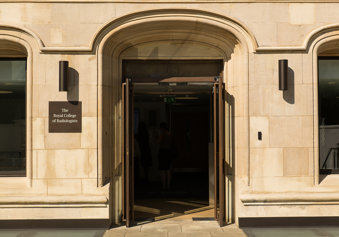Partnership working in clinical oncology
Clinical oncology and medical oncology – working together
The Joint Working Group supports and enables clinical oncology and medical oncology to deliver on key strategic and operational issues that are important to both specialties.
Radiotherapy Board
The Radiotherapy Board provides guidance, oversight and support for the continuing development of high-quality radiotherapy services for cancer patients in the UK.
The UK SACT Board
The UK Systemic Anti-Cancer Therapy (SACT) Board provides guidance, oversight and support for the continuing development of SACT services in the UK.
It was established in 2013 as the “UK Chemotherapy Board” by The Royal College of Radiologists, the Royal College of Physicians, the Association of Cancer Physicians, the Royal College of Pathologists, the British Oncology Pharmacy Association and the UK Oncology Nursing Society. The Board has representation from across the four UK nations and from other organisations closely involved in SACT services.
The Board was renamed the “UK SACT Board” in November 2022.
The role of clinical oncologists
Clinical oncologists can deliver all non-surgical treatment modalities for cancer: radiotherapy (external beam, brachytherapy, proton beam therapy and molecular radiotherapy) and systemic anti-cancer therapy (SACT – chemotherapy, immunotherapy, biological and hormonal therapies).
Working together for cancer care
Most clinical oncologists deliver some therapies in partnership with medical oncologists or haematologists, as well as with the wider multi-disciplinary team through skill mix. This enhances patient experience and the quality and cost-effectiveness of the service delivered. Shared governance, for example through peer review meetings, ensures ongoing professional development of all members of the team, medical and non-medical alike.
Increasingly, clinical oncologists participate in, and may lead, multiple teams comprising medical oncologists, haematologists and other independent practitioners from allied health professional groupings. This ensures that patients are treated in a timely fashion by a competent practitioner but that access to specialist clinical expertise is maintained for those with complex requirements.
National partnerships
This multi-professional partnership in non-surgical cancer care is supported by several committees which facilitate collaborative working by professional bodies at a national level on matters of policy, provision of expert opinion and delivery of professional guidance. The Radiotherapy Board and UK Systemic Anti-Cancer Therapy Board have representation from across the four UK nations and from other organisations closely involved in radiotherapy and SACT services.
There are many areas of common interest to the clinical and medical oncology specialties. The Joint Collegiate Council for Oncology (JCCO) was previously established by the RCR and the RCP to collaborate and advise on matters such as training, staffing, service needs and resources for the treatment of cancer. However, following a review of the benefits of closer working between the two specialties of clinical oncology (CO) and medical oncology (MO), the JCCO was dissolved in spring 2024. A new forum for intercollegiate liaison is under consideration. In addition, in response to a recommendation from the closer working review, a Joint Working Group has been established between the RCR and the Association of Cancer Physicians to facilitate collaboration between CO and MO.
Affiliated bodies
The following two bodies have each been affiliated to The Royal College of Radiologists through a Memorandum of Understanding:
- UK SABR Consortium - the aim of the UK SABR Consortium is to improve the care and treatment of patients by developing Stereotactic Ablative Radiotherapy (SABR) in the UK, through the provision of a multi-disciplinary educational forum and promotion of clinical and scientific research.
- National Oncology Trainees Collaborative for Healthcare Research (NOTCH) - NOTCH has been established to increase the number of opportunities for clinical and medical oncology trainees to gain experience of, and training in, research.
In addition, the Molecular Radiotherapy (MRT) Consortium is affiliated to The Royal College of Radiologists through an existing Memorandum of Understanding with the British Nuclear Medicine Society. The MRT Consortium aims to improve equitable access to MRT delivery in the UK. It became part of the BNMS in 2023.
Site-Specialty Groups and Societies
There are a number of oncology Site-Specialty Groups and Societies (SSGS) that support healthcare professionals in the UK who manage and treat patients with particular forms of cancer. The SSGS provide site-specialty advice and expertise. Below are links to those SSGS that have a formal online presence:
British Association of Head and Neck Oncologists
British Gynaecological Cancer Society
British Neuro-Oncology Society
British Thoracic Oncology Group
Children’s Cancer and Leukaemia Group
About us
We are The Royal College of Radiologists – the leading professional membership body for clinical radiologists and clinical oncologists, supporting doctors throughout their career so that they can make a real difference.
